By Lucy Kang, with help from April Newman
KPFA News
December 12, 2018
(Names have been changed and/or omitted to protect the security of the migrants.)
Central American migrants line up outside a car carrying bags full of clothes. The car pulls up outside the gates of El Barretal, a nightclub venue on the outskirts of Tijuana. The space has been transformed into a makeshift home for approximately three thousand migrants who traveled
here with the most recent caravan.
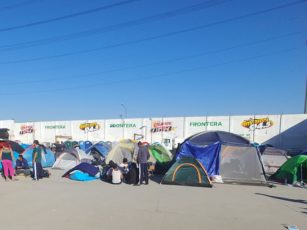
Inside, rows of tents sprawl across the concrete pavement, exposed to the elements. One corner is taken by dozens of port-o-potties; medical tents line another. Further back is an enclosed building for women and families.
This is a space in transition as busloads of new migrants continue to arrive. Migrants from the caravan were originally housed in Benito Juarez stadium, which flooded badly in recent rains and has since been closed. However, El Barretal is more remote and isolated, a half hour drive from the US-Mexico border where asylum seekers will need to present themselves.
Those are shouts of “we want shoes” outside El Barretal’s storage facility. Shoes are one of the most requested items, as are tents. Some migrants say that the donated goods are being distributed too slowly, especially during the cold winter nights in Tijuana.
One National Institute of Migration (INM) official who declined to give his name explained that the delay is due to the transition to the new incoming government of President Andrés Manuel López Obrador. “There’s a problem of information right now, basically, it’s not a problem of resources. There’s enough of everything,” says the INM official.
“It’s not a problem of resources. There’s enough of everything.”
However, mistrust of the distribution system persists among migrants, and they say it is vulnerable to corruption. Others are concerned about the lack of drinking and bathing water and adequate toilets, especially as the population continues to grow.

One woman says there is “no water to shower. You can never shower. And there’s no water in the toilets.” Another complains that toilets are being serviced every three days, rather than every day. Others raise up concerns about not getting enough drinking water.
“There is no water to shower. You can never shower. And there’s no water in the toilets.”
Who are the migrants who are staying here?
Ada and her husband fled the gangs in Honduras and are trying to make their way to the United States. Ada says they were kidnapped during the journey when they got separated from the caravan.
“A van drove by, and took us,” she says.
But Ada’s quick thinking may have saved their lives.
“We jumped out,” she continues. “I started it. A friend of mine who was with us, I’ve cried a lot for her because she was pregnant and she lost her baby. Because she also jumped out.”
When asked if she could return to Honduras, Ada replies, “No. We are scared. Too scared. For our family, for our daughter. For that reason we did not bring the baby, because she’s so little. She was only two months when we left. We didn’t want to risk her life.”
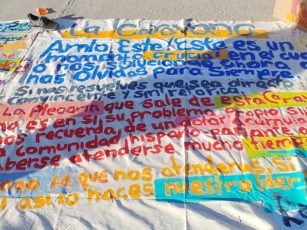
Despite all that’s happened, Ada hasn’t given up hope. “I have faith in God, that he will open the doors for us,” she says. “Because everything we’ve been through is true. We have proof. Proof.”
Migrants like Ada are caught in a limbo. They are fleeing violence and poverty in Central America from countries destabilized by decades of US intervention. But many are unable to move forward because, as critics argue, the US is illegally keeping asylum seekers from being able to make their claims. So Ada and the others may be staying in El Barretal for a long time.
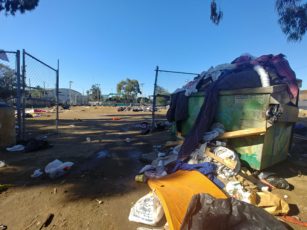
Rodolfo Olimpo Hernández Bojórquez, head of the Baja California Commission for Attention to Immigrants, says he expects that the migrants will remain here for at least eight to 12 more months. He adds that Mexico will issue thousands of work permits to the migrants.
He expects that the migrants will remain here for at least eight to twelve more months.
“It’s not the first time we received this number of immigrants,” he says. “And last year’s we received close to 23,000 Haitians. And 3,000 of them, they are working right now in Tijuana. The maquiladora industry announced to us that there’s a need for 12,000 more employees here in Baja, and we were we know these people can provide the kind of jobs for them.”
Maquiladoras refer to foreign, often US-owned factories in developing countries historically criticized for providing poor wages and dismal working conditions.
While some migrants want to stay in Mexico, others don’t. And those who want to go north face a US-created bottleneck at the border. Irineo Mujica of migrants’ rights organization Pueblo Sin Fronteras is supporting a group of hunger strikers.
“The number one demand is for the United States to have to the Asylum seeking process facilitated a little bit more,” says Mujica. “We want the number of asylum petitions to go to increment because they only allow 40 and then there is not there’s not enough for the hundreds of people that are staying there.”
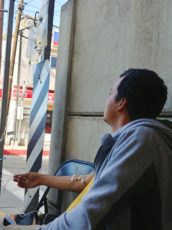
The hunger strikers are calling for the San Ysidro border in Tijuana to start processing 300 asylum claims a day to speed up the process.
Outside the San Ysidro pedestrian border crossing, a nurse inserts an IV needle into the arm of a hunger striker named Jose so he doesn’t get dehydrated. Jose, who’s from El Salvador, is on a week-long hunger strike along with fourteen others. He says he’s standing up for the rights of himself and the rest of the asylum seekers in a peaceful manner.
“For now, I’m at day four, three more to go,” he says. “But yes, we can go through with it. We can go through with it. It’s worth it. It’s worth the effort.”
“We can go through with it. It’s worth it. It’s worth the effort.”
Jose is adamant that he wants to go to the US through legal means. He says he has added his name to the list of asylum seekers waiting to be processed. Now he’s expecting to wait six weeks before he can make his case.
And the list that holds Jose’s shot at asylum?
“It’s a book,” he says. “And on that book they just write down your name and a number. It seems really simple.”
A simple notebook holds Jose’s future. A lawsuit by legal organization Al Otro Lado argues that the US border patrol’s policy of turning away and delaying asylum seekers – and thus the list – are illegal under both US asylum law and the 1951 Refugee Convention.
That delay is keeping some migrants like Junior from even trying. He says he’s hasn’t seen evidence that the asylum process is working.
“Like we say in Honduras, see it to believe it,” he says. “That’s why I haven’t signed up yet.”
Then there’s the question as to where asylum-seekers will wait while their cases are being heard. A rumored deal between President Trump and President López Obrador would see migrants waiting in Mexico while their US asylum claims are being processed. Irineo Mujica of Pueblo Sin Fronteras is critical of that plan.
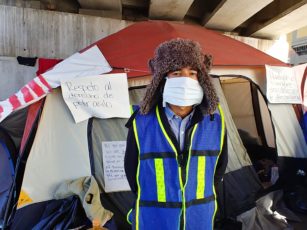
“I know that’s what the Donald Trump wants,” says Mujica. “It is illegal. Someone, if someone wants to ask for asylum in Mexico, they can ask for asylum in Mexico. Someone wants to ask for asylum in the United States because Mexico’s not safe, they should have the right to ask for asylum in the United States – not in Mexico.”
As for hunger striker Jose, life goes on Tijuana while he, like so many others, waits for his number to be called.
When asked what gives him the strength to continue, he answers, “Thinking about my family. Thinking about the possibility I may have over there. Thinking that maybe a door will open and being able to progress and move forward.”
———-
Lucy Kang is a reporter with KPFA Radio.

